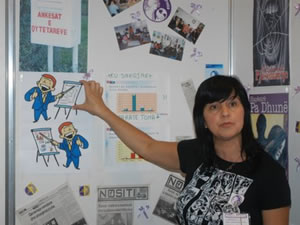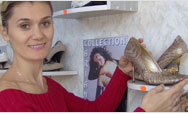Idea Marketplace Strengthens NGO Participation in Corruption Fight
31 NGOs Qualify to Submit Proposals to USAID’s Grant Program
On September 30, Albanians thronged the Tirana International Hotel, the venue for the country’s first NGO Marketplace. In the hotel’s lobby, conference rooms and ballroom, a diverse collection of Albania’s civic groups were fervently ‘selling’ corruption-fighting ideas to thousands of ‘buyers,’ who, in turn, would cast ballots for the groups with the best concepts.
“The participation at this event is really unexpected,” said Edward Landau, USAID/Albania Mission Director. “It is an exciting and encouraging sign of the commitment of average Albanians to find ways to end corrupt practices in their country.”
The brainchild of USAID’s Rule of Law project, the Marketplace typifies the project’s nuanced approach to supporting the fight against corruption. In Albania, corruption is as much a local phenomenon as a national one. Following the publication of the USAID-sponsored Corruption in Albania 2005 Survey, the Rule of Law project organized a series of discussion sessions in 10 Albanian cities to inform local governments and communities about the survey findings. The roll-out demonstrated that different regions in Albania consider some forms of corruption as more critical, leading the project to focus at the local, grassroots level.
According to Gerald Meyerman, Chief of Party for USAID’s Rule of Law project, the right strategies to fight corruption and to foster transparent and accountable governance need to be tailored to local realities and culture. The best way to achieve this is by inviting community groups and NGOs to propose innovative ideas that deliver results at the local or national level.
The project’s first call for proposals resulted in submissions from 144 NGOs across Albania, of which 54 were selected to compete as finalists and exhibit proposals at the event. Twenty-five finalists were organizations from outside the capital city, Tirana.
“From a local perspective, we hope to see cities like Gjirokaster, for example, take the lead in fighting corruption in education, Saranda in monitoring building permits, Vlora in health,” explains Meyerman. “Such an approach builds local support for the national fight and assists in building a knowledge-base of what works and what does not.”
After installing themselves in booths throughout the hotel, the NGO participants spent the better part of the day “pitching” their concepts to the public, a panel of judges and the media.
Winners were selected by public voting (20%), technical evaluations (40%) and a panel of judges (40%). The large public turnout was truly unexpected—at the end of the day additional support was needed to count 1500 ballots before announcing the winners. Each finalist received a certificate of participation; the 31 winners were given plaques and a commitment from USAID’s Rule of Law program to help develop and ultimately, fund, their proposals in accordance with USAID regulations and grant award procedures.
Searching for solutions beyond the established channels through an open, transparent, and competitive process proved to be a unique and welcomed approach. Fifteen of the 31 pre-qualifying winners are from organizations outside of Tirana, and17 winners are women’s organizations; their success has helped to increase the level of attention to this issue and to the lesser-known NGOs in Albania. The Marketplace galvanized not only NGOs, but volunteers, and Albanians young and old to contribute to the fight against corruption.
“Broader support by Albanian grass-roots organizations is critical,” stated Landau in his closing remarks, “Ultimately the sustainability of Albanian civil society will be based on the commitment of Albanians like those here today.”
 |
 |
| “Where does the money go?” Afrovita Gusho, head of the "Une, Gruaja!”
(Me, the woman), seeks to improve the transparency of the budgetary
process in Pogradec. |
A buzz of excitement fills the market floor as ballots are cast for the best
corruption-fighting ideas. |
Back to Top ^ |


